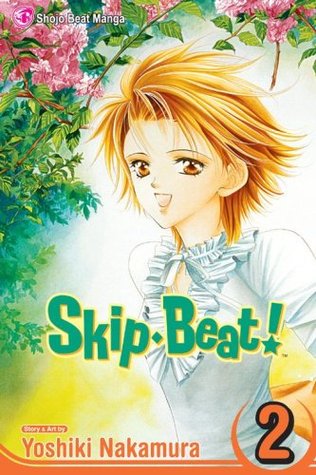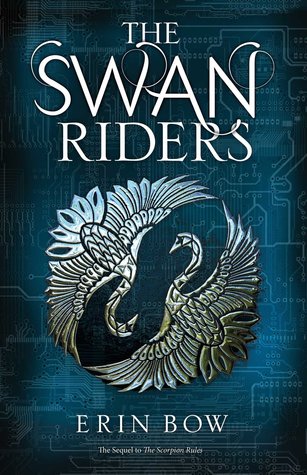Well, it turns out I had barely crossed the lip of the rabbit hole. Anime is mostly based on manga, the Japanese version of comic books or graphic novels, and manga is an entire universe unto itself. I am now falling infinitely into more and more addictive imaginary worlds. I blame Nafiza, from Book Wars, who started it all with this post about Skip Beat.
 Skip Beat (the title tells you nothing, don't even worry about it, just read Nafiza's description) does have an anime adaptation, which I obsessively watched all 25 episodes of on Crunchyroll, only to discover that the story has barely started (this is a common thing, where popular mangas get turned into animes, but only the first few volumes get animated, I guess because it's expensive and time-consuming). But lucky me, my library has all 37 extant volumes of the manga. Yes. 37. And it's not over yet! She's still putting out a new chapter every month (there are about 5 chapters per volume. it's not like 37 novels or anything. but still).
Skip Beat (the title tells you nothing, don't even worry about it, just read Nafiza's description) does have an anime adaptation, which I obsessively watched all 25 episodes of on Crunchyroll, only to discover that the story has barely started (this is a common thing, where popular mangas get turned into animes, but only the first few volumes get animated, I guess because it's expensive and time-consuming). But lucky me, my library has all 37 extant volumes of the manga. Yes. 37. And it's not over yet! She's still putting out a new chapter every month (there are about 5 chapters per volume. it's not like 37 novels or anything. but still).So since I'm all caught up with Kyoko's evolution as an actress and her excruciatingly slow romance, I had to find other mangas to fill my new need for cool combinations of story and art and heaping doses of Japanese culture. Here are some series I can highly recommend:
 Akatsuki no Yona, or Yona of the Dawn: historical fantasy about a sheltered princess who escapes with her loyal bodyguard after her father the king is murdered, and then wanders the kingdom looking for the dragon warriors that are supposed to show up when the kingdom is in trouble. Gorgeous, gorgeous art, and wonderful characters. I love Yona's journey into strength; I love her bodyguard Hak's devotion; I love Soo-Won (I can't say anything about him because spoilers. but his hair. is. so. beautiful.) And the dragon warriors are all utterly delightful. I'm buying this one as it comes out in English (only 2 volumes are available so far) but reading the unofficial fan translations*, which are up to chapter 130 now.
Akatsuki no Yona, or Yona of the Dawn: historical fantasy about a sheltered princess who escapes with her loyal bodyguard after her father the king is murdered, and then wanders the kingdom looking for the dragon warriors that are supposed to show up when the kingdom is in trouble. Gorgeous, gorgeous art, and wonderful characters. I love Yona's journey into strength; I love her bodyguard Hak's devotion; I love Soo-Won (I can't say anything about him because spoilers. but his hair. is. so. beautiful.) And the dragon warriors are all utterly delightful. I'm buying this one as it comes out in English (only 2 volumes are available so far) but reading the unofficial fan translations*, which are up to chapter 130 now. Chihayafuru: contemporary realistic story about a girl whose friendship with two boys develops along with her passion for a competitive card came called karuta. This one has a lovely anime adaptation, that, again, only goes so far. The manga is up to 173 chapters now, and it looks like the story will follow all the characters into university at this rate! Another very slow romance, but mostly it's about developing strength, friendship, leadership, teamwork. I keep almost getting bored with all the detail about a card game I'll never play, but I care so much about the characters I eagerly await the next chapter. Great art. Taichi has the most beautiful eyes of any manga guy.
Chihayafuru: contemporary realistic story about a girl whose friendship with two boys develops along with her passion for a competitive card came called karuta. This one has a lovely anime adaptation, that, again, only goes so far. The manga is up to 173 chapters now, and it looks like the story will follow all the characters into university at this rate! Another very slow romance, but mostly it's about developing strength, friendship, leadership, teamwork. I keep almost getting bored with all the detail about a card game I'll never play, but I care so much about the characters I eagerly await the next chapter. Great art. Taichi has the most beautiful eyes of any manga guy. Ore Monogatari!!! or My Love Story!! (exclamation points are required): adorable and trope-subverting romance between a big ugly guy who is the sweetest softie at heart and the girl who recognizes how great he is. Other awesome characters include the good-looking best friend who should get all the girls but hasn't fallen in love with anyone yet, and everyone's parents, who actually play roles in the story (great meeting-the-parents scenes, for example). Realistically awkward high-school romance (takes them weeks to work up the courage to hold hands!) So cute and funny!
Ore Monogatari!!! or My Love Story!! (exclamation points are required): adorable and trope-subverting romance between a big ugly guy who is the sweetest softie at heart and the girl who recognizes how great he is. Other awesome characters include the good-looking best friend who should get all the girls but hasn't fallen in love with anyone yet, and everyone's parents, who actually play roles in the story (great meeting-the-parents scenes, for example). Realistically awkward high-school romance (takes them weeks to work up the courage to hold hands!) So cute and funny!Well, there's more, but I'm not sure I want to admit how much I've read in the last few months! For lots more recommendations of both manga and North American graphic novels, Nicola Mansfield has a great blog.
And if you really want to know what other anime I've enjoyed . . .
Bleach (again with the not helpful titles; it probably makes more sense in Japanese)—soul reapers dispatch evil lost souls with really cool sentient swords, and occasionally attend their high school classes. After 100 episodes it started to feel repetitious, so I haven't finished all 15 seasons, but there's a reason this one is one of the most popular animes. (His name is Ichigo.)
Blue Exorcist—Rin is the son of Satan but he was raised by a priest and he wants to become an exorcist; if only he could stop bursting into blue flames whenever he gets upset. Lots of intriguing characters (the head of the exorcist school is Mephisto Pheles; might he possibly have a hidden agenda?) and complex relationships (like that between Rin and his twin brother who didn't inherit any demonic powers), great art, lots of humour, and a plot that develops nicely and comes to a satisfying conclusion at the end of 25 episodes.
The Irregular at Magic High School—cool future in which magic is developed like technology and is used in warfare (of course); a brother and sister navigate a high school divided into higher- and lesser-skilled magic-users, but the brother has more talent than meets the eye.
Those three are on Netflix, in case you wanted to just take a look (Crunchyroll has some series you can watch for free but some stuff you have to have an account to watch.)
And I think I'll leave it at that for now! I welcome recommendations: have you watched or read anything you've loved?
*It's considered semi-acceptable to read these "scanlations" on a site like Batoto that doesn't use advertising (thus making money off the efforts of the original author and the volunteer translators), as long as you buy the official versions whenever you can. Since not all mangas are ever published in English, sometimes it's the only way to read them.


